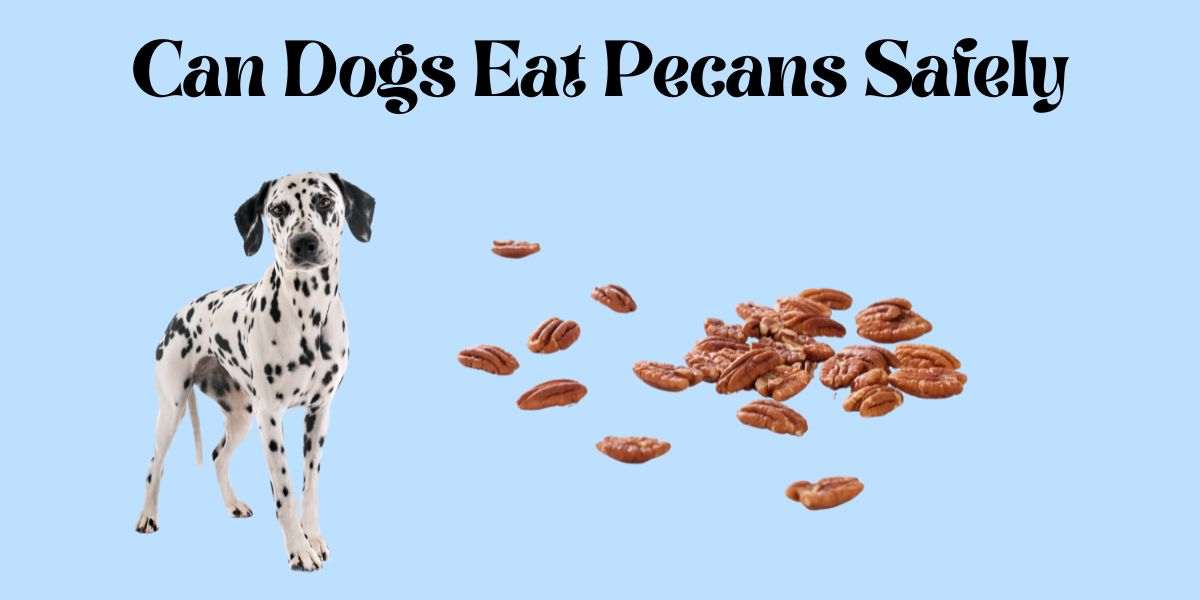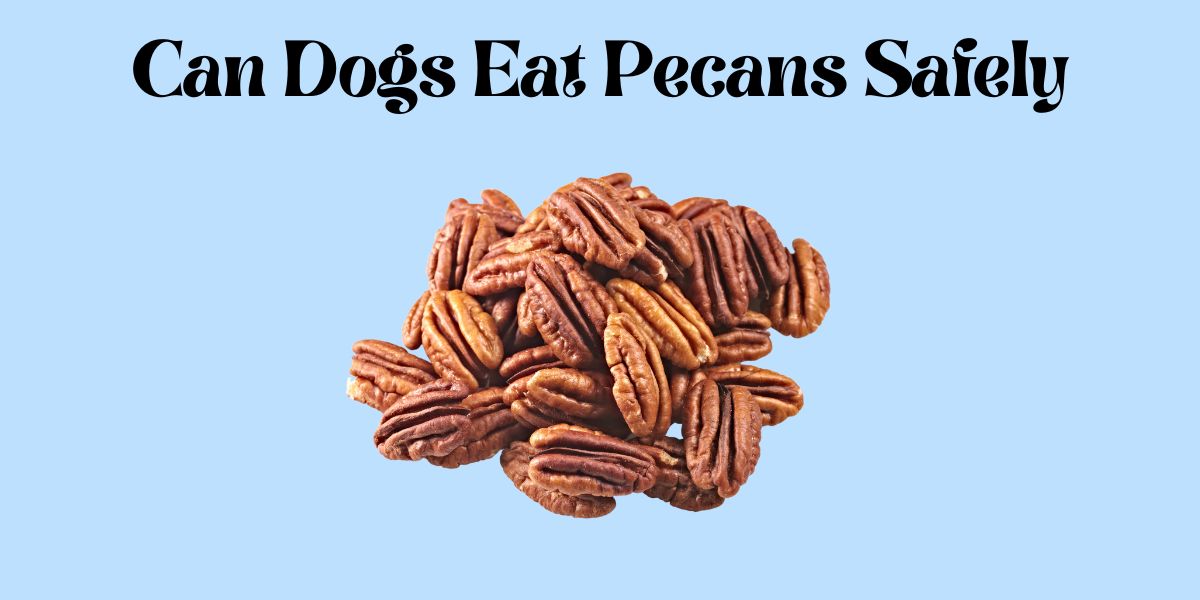Can Dogs Eat Pecans Safely?

Are you a dog owner with a curious pup who’s always eyeing your stash of pecans? If so, you may have wondered: can dogs eat pecans safely? While pecans may seem like a tempting treat for your furry friend, it’s important to know whether they are actually safe for dogs to consume. In this article, we will explore the potential risks and benefits of dogs eating pecans, so you can make an informed decision about whether or not to share this nutty snack with your canine companion.
Overview of Pecans
What are pecans?

Pecans are delicious and nutritious tree nuts that are native to North America. They are commonly used in a variety of sweet and savory dishes, and also enjoyed as a snack on their own. Pecans have a distinct buttery flavor and a slightly sweet taste, making them a popular choice among nut lovers.
Nutritional value of pecans
Pecans are not only tasty, but they also offer several nutritional benefits. These nuts are a good source of healthy fats, particularly monounsaturated fats, which can help support cardiovascular health. They are also rich in fiber, which aids digestion and helps maintain a healthy weight. Pecans are packed with antioxidants, such as vitamin E, which can protect the body against oxidative stress and inflammation. Additionally, they provide important minerals like manganese, zinc, and magnesium, as well as B-complex vitamins.
Potential health benefits of pecans
The nutritional composition of pecans makes them a powerhouse of health benefits. Regular consumption of pecans has been associated with improved heart health, as they can help lower LDL (bad) cholesterol levels and reduce the risk of heart disease. Pecans are also known to support brain health due to their high content of vitamin E and antioxidants, which can protect against age-related cognitive decline. The fiber in pecans aids in digestion and promotes a healthy gut. Furthermore, the nutrients in pecans support overall immune function, bone health, and contribute to a balanced diet. However, it is important to note that these benefits are primarily observed in humans and not necessarily applicable to dogs.
Dangers of Feeding Pecans to Dogs
Toxicity of pecans to dogs
While pecans can be a nutritious and enjoyable treat for humans, they can pose serious health risks to our canine companions. Pecans, specifically the outer shells and husks, contain a compound called juglone, which is toxic to dogs. Juglone can cause a range of adverse reactions in dogs when ingested, including gastrointestinal upset, pancreatitis, and even kidney damage in severe cases.
Health risks associated with pecan consumption in dogs
Feeding pecans to dogs can have detrimental effects on their health. The high fat content of pecans can lead to pancreatitis in dogs, a condition characterized by inflammation of the pancreas. Additionally, the consumption of pecans can cause digestive issues such as vomiting, diarrhea, and abdominal discomfort in dogs. In some cases, dogs may experience an allergic reaction to pecans, resulting in symptoms like itching, swelling, and difficulty breathing. Therefore, it is essential to be aware of these risks and avoid feeding pecans to your furry friend.
Symptoms of Pecan Toxicity in Dogs

Indications of pecan poisoning in dogs
There are specific signs to watch out for if you suspect your dog has ingested pecans. One of the initial indications of pecan poisoning is gastrointestinal upset, such as vomiting and diarrhea. Dogs may also display signs of abdominal pain or discomfort, which can be evident through restlessness, whimpering, or reluctance to move. Additionally, you may notice changes in your dog’s behavior, including lethargy or a lack of appetite. If you observe any of these symptoms and suspect pecan poisoning, it is crucial to seek veterinary attention immediately.
Common symptoms of pecan toxicity
Pecan toxicity can manifest in various ways in dogs. Common symptoms include nausea, excessive drooling, dehydration, and increased thirst. Dogs may experience difficulty breathing, as pecans can cause respiratory distress in some cases. Itchy skin, hives, and facial swelling are also potential signs of an allergic reaction to pecans. If left untreated, pecan toxicity can lead to more severe consequences, such as organ damage and even death. Therefore, prompt identification and treatment are vital.
Potential Hazards of Pecan Ingestion
Choking hazards
One of the primary hazards associated with pecan ingestion in dogs is the risk of choking. Pecans have a hard texture, especially when consumed in large quantities, which can pose a choking hazard to dogs. The size and shape of pecans may make it difficult for dogs to swallow them properly, leading to choking or obstruction of the airway. This is particularly concerning for smaller dog breeds or those with preexisting respiratory issues. Therefore, it is crucial to prevent dogs from accessing pecans to avoid this potential danger.
Digestive issues
The consumption of pecans can disrupt a dog’s digestive system, causing gastrointestinal problems. The high fat content in pecans can lead to digestive disturbances such as vomiting, diarrhea, and abdominal pain. These symptoms can be particularly distressing for dogs, and prolonged exposure to pecans can result in dehydration and nutrient imbalances. In some cases, dogs may require veterinary intervention to address these digestive issues and restore their gastrointestinal health.
Pancreatitis risks
Pancreatitis is a serious condition that can be triggered by the ingestion of pecans in dogs. The pancreas plays a vital role in digestion by producing enzymes to break down food. However, the high fat content in pecans can overwhelm the pancreas and cause inflammation, leading to pancreatitis. This condition can cause severe abdominal pain, loss of appetite, lethargy, and can even be life-threatening if not treated promptly. It is essential to recognize the risks associated with pecan consumption and avoid exposing dogs to this potential hazard.
Safe Alternatives for Dogs
Dog-friendly nuts
While pecans are not suitable for canine consumption, there are a few nuts that can be safely enjoyed by dogs in moderation. For example, unsalted and unseasoned peanuts, almonds, and cashews can serve as potential alternatives to pecans. However, it is crucial to consult your veterinarian before introducing any new foods into your dog’s diet, including nuts. Additionally, it’s important to remember that nuts should always be given to dogs in small quantities and as an occasional treat, as their high-fat content can still pose risks to their health.
Other healthy treat options
If you’re looking for other tasty and safe treat options to reward your dog, there are plenty of alternatives to consider. Fresh fruits like apples, blueberries, and watermelon can be a delicious and nutritious choice for dogs. Vegetables such as carrots, green beans, and sweet potatoes can also make satisfying and healthy treats. Always remember to feed these foods in moderation and remove any seeds, pits, or skins that could present choking hazards or be toxic to dogs. Opting for dog-specific treats from reputable brands is another reliable way to ensure your furry friend receives safe and enjoyable rewards.
How to Treat Pecan Poisoning
When to call a veterinarian
If you suspect your dog has ingested pecans or is showing symptoms of pecan poisoning, it is advisable to contact your veterinarian immediately. Time is of the essence when it comes to potential toxicities, and professional guidance is crucial for proper diagnosis and treatment. Even if your dog has only consumed a small amount of pecans, it is best to err on the side of caution and seek veterinary advice promptly.
Treatment options for pecan poisoning
The treatment for pecan poisoning will depend on the severity of the symptoms and the specific condition of the affected dog. In most cases, the veterinarian will induce vomiting or administer activated charcoal to limit further absorption of toxins. Supportive care, including intravenous fluids and medication to manage symptoms, may be necessary. In severe cases, hospitalization and intensive care may be required. Each case of pecan poisoning varies, so it is essential to follow the veterinarian’s advice for the well-being of your beloved pet.
Prevention and Tips
Keeping pecans out of reach
Prevention is the key to ensuring your dog’s safety. To protect your furry friend from pecan poisoning, it is important to keep pecans and pecan-containing products out of their reach. Store pecans securely in tightly sealed containers or cabinets that are inaccessible to your dog. Be mindful of guests or family members who may unknowingly leave pecans within the dog’s reach. By proactively preventing access to pecans, you can significantly reduce the risk of accidental ingestion and potential health complications.
Educating others about pecan dangers
Raising awareness about the dangers of feeding pecans to dogs is essential. Educate your family, friends, and guests about the potential risks and toxic effects of pecans on canines. Encourage them to avoid giving any foods containing pecans or pecan byproducts to your dog, as even small amounts can be harmful. Sharing this knowledge can help create a safer environment for dogs and prevent accidental pecan poisoning.
Alternatives for rewarding your dog
Instead of using pecans or other potentially harmful foods as treats, explore alternative reward options that prioritize your dog’s health and safety. Consider approved dog treats available in pet stores, which are specifically formulated to meet the dietary needs of dogs. You can also utilize positive reinforcement techniques like praise, petting, or playtime to reward your dog’s good behavior. By focusing on safe and effective alternatives, you can maintain a positive and enriching relationship with your furry companion.
Conclusion
While pecans offer various health benefits for humans, they can be toxic and pose serious risks to our furry friends. Dogs should not consume pecans due to their potential toxicity and associated health complications. It is crucial to be vigilant and to prevent dogs from accessing pecans or pecan-containing products to ensure their well-being. By educating ourselves and others about the dangers of pecans, we can create a safer environment for our beloved canine companions. Remember to consult your veterinarian for personalized advice regarding your dog’s dietary needs and safe treat alternatives. With proper care and attention, we can keep our dogs’ tails wagging and their health thriving.